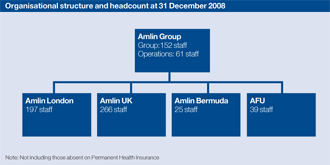Review
People
Organisational development
One of the major activities in 2008 was to support the changes to the Group organisational structure, specifically the establishment of Amlin London as a separately managed business entity. This organisational change was supported by a number of key internal appointments, demonstrating the Group’s commitment to provide meaningful development and real career opportunities for our existing staff. These appointments in underwriting, finance and more general management roles were complemented by a number of key external appointments which provided the opportunity to recruit fresh talent and bring outside experience into the organisation.

Click here for full sized image
In this way, the Group further strengthened its expertise in the areas of strategy, investment risk, tax, claims management and underwriting, particularly in cargo, accident & health and outwards reinsurance.
Prior to the Group’s organisational changes, we had to implement contingency arrangements in response to the Group Underwriting Director’s illness at the start of the year and then draw on longer-term succession plans in preparation for his departure on 31 December 2008. Succession for Tony Holt’s various responsibilities was addressed through a combination of organisational change, internal promotion and external recruitment – all as planned for in the 2007 Group Succession Plan.
2008 was a year of considerable change and it is a testimony to the strength and depth of the Group’s talent base, and to the rigour of the Group Succession Plan, that these changes were introduced successfully and without any significant interruption to business operations or performance.
The Group also established, or acquired, a number of new enterprises in 2008. These included the opening of a representative office in Chicago, the Group’s first operation in North America, the launch of a new traded insurance risk venture, Leadenhall Capital Partners LLP (LCP), and the acquisition of Anglo French Underwriters. The Chairman and CEO of Leadenhall were appointed in April and the resident vice president of Amlin Illinois. was appointed in August. AFU employs 39 staff.
In November, following a review of the medium to long term profitability of our trade credit insurance business, the Group made the decision to withdraw from the trade credit market with immediate effect, resulting in the run-off of existing business. Group policy states that where it becomes necessary to reduce staff numbers, whether for economic or other reasons, the Group will try to minimise the effect on those concerned. Following the announcement, Group HR instigated a detailed consultation process for all affected staff, which is currently ongoing for a number of individuals. Whilst alternative employment opportunities will be sought for relevant staff, it is expected that the closure of the business will unfortunately result in a number of redundancies. Where compulsory redundancy proves to be unavoidable the Group will manage the redundancy in the most fair, consistent and supportive manner possible. At 26 November 2008, 25 staff were employed in Amlin Credit.
The Group continued to sponsor and promote its tailored development programme, Compass, which was initially launched in 2007. The programme was limited to a small number of individuals who were either already in a leadership role or who had been identified as having the potential to take on a more senior role in the future.
The primary focus during 2008 was implementing tailored development programmes for these individuals which were agreed following assessments in 2007. In total, 27 separate development activities were identified and approximately 50 development actions were completed during the year.

Click here for full sized image
The flagship development programme was delivered by ASK Europe: a five-day residential programme focused on leadership styles. Other development solutions range from proprietary programmes run by external partners such as Ashridge Business School, INSEAD and Henley Business School, to bespoke coaching and mentoring programmes designed to meet individual development needs.
The Compass leadership programme will continue in 2009 with more participants being assessed to join the programme so that we continue to identify and develop longer-term leadership talent.
In conjunction with the above initiative, the Group Succession Plan was reviewed and updated. The primary objective is to improve business continuity and performance through a planned and strategic approach to the resourcing and development of key staff. We believe that succession planning in business is a combination of talent acquisition and retention, employee engagement, career management and successful personal development.
Throughout 2008 work continued in developing bespoke competency frameworks for various parts of the business, designed to more clearly capture the key behaviours and outputs which differentiate between effective and superior performance. These form the basis for reviewing performance, assessing competency and for identifying training and development needs.
The Performance and Development Review (PDR) process remains the primary framework for assessing staff. A structured but flexible framework enables managers to provide clarity around business objectives, assess individual competency and identify career and personal development plans. An online PDR system has been in use for a number of years and further developments were introduced in 2008 to improve functionality.
